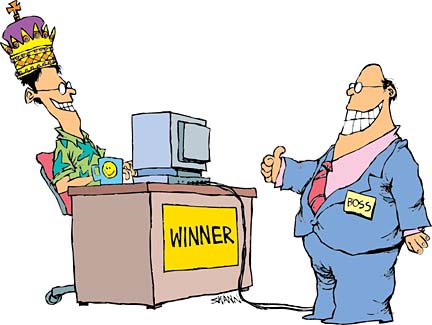

A forum for Hawaii's
business community to discuss
current events and issues
If I had a quarter for every time I've been asked, "What does all this touchy-feely stuff have to do with the bottom line?" the pile would look like I'd hit three cherries at Las Vegas. So let me see if I can boil the issue down to its simplest issues.
Our levels of self-esteem -- our feelings about ourselves -- directly influence a variety of factors: how confident we feel about our abilities to handle new and challenging tasks; the extent we are willing to take the moderate risks so characteristic of people with a desire to excel at whatever they do; the extent to which we can resist getting frozen by fear of the unknown; our willingness to think for ourselves, to offer ideas that might be opposite to those taken by the majority. In the jargon of the day, people with high self-esteem are often spoken of as "having it all together."
The research is clear. During periods of low organizational change, when things are relatively certain and predictable, people with high self-esteem clearly stand out above the rest in terms of morale, productivity and satisfaction. In other words, they not only out-produce every one else, they also do not poison the environment for others with the constant negativity and whining that characterizes their low-morale colleagues.
However, as we are all too well aware, periods of low organizational change are few and far between these days. Turmoil, ambiguity and uncertainty are more the soup du jour. Those with high self-esteem suffer the natural human consequences of these conditions -- their productivity, morale and satisfaction do drop a bit from very high to high. But their low-self-esteem counterparts really fall apart with plummeting morale, satisfaction and productivity figures.
To fully grasp the managerial implications of these repeated findings, we need to be certain we understand the fundamental roots of our feelings of self-esteem.
Let's take an extreme example. Have you ever seen a puppy dog sidle up to you when you reached out to pet it in a hesitant, fearful, okole-first manner in anticipation of a rapid getaway?
If you have, you've seen a puppy that has been very badly treated by someone.
To be sure, our feelings of self-worth can be traced to our childhoods. But current circumstances, specifically relationships with significant others -- like managers -- can and do activate old self-effacing scars where they exist. They also can and do activate new and more positive self-images.
The Pygmalion Effect, the self-fulfilling prophecy, operates regardless of whether our beliefs and actions are self-esteem producing or self-defeat producing.
So if you're a CEO, sit back and ask yourself, Do you have any policies and procedures that might be causing people to feel de-valued? Do you have any managers or supervisors who you know can be really verbally harsh sometimes? Does your organizational culture create win-win or win-lose dynamics among people?
For the facts are clear: Employees who are treated as valuable assets cannot help but be of greater value to you, and to themselves. In other words, if your people are made to feel like winners, you can't lose.
Irwin Rubin is a Honolulu-based author and president of Temenos Inc., which specializes in executive leadership development and behavioral coaching, communication skill-building training and large-system culture change. His column appears twice a month in the Honolulu Star-Bulletin. Send questions and column suggestions to temenos@lava.net, or visit temenosinc.com.
To participate in the Think Inc. discussion, e-mail your comments to business@starbulletin.com; fax them to 529-4750; or mail them to Think Inc., Honolulu Star-Bulletin, 7 Waterfront Plaza, Suite 210, 500 Ala Moana, Honolulu, Hawaii 96813. Anonymous submissions will be discarded.

